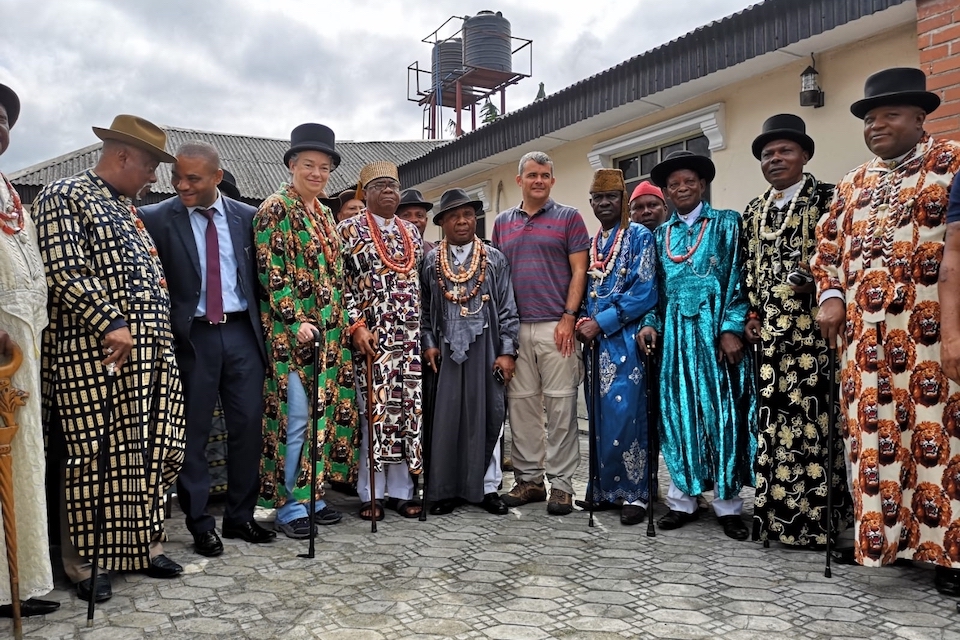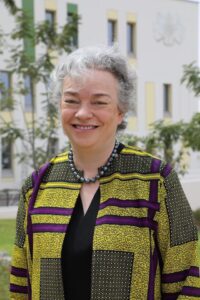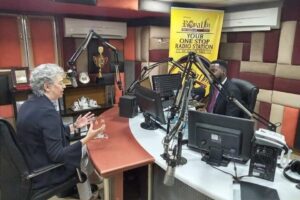
Gill Atkinson, Deputy High Commissioner to Nigeria, shares her inspiring account of living and successfully working with an invisible disability.
I was recently asked in a FCDO survey, ‘Do you self-define as disabled?’ At a personal level, the question annoyed me because the answer is straightforward – no. I do live with a disability though. I have epilepsy but it’s not how I define myself. I couldn’t work out how to answer. By saying no, the diversity statistics would be wrong, but by saying yes, I would give an untrue answer. I said no, and gave a pithy comment at the end….
My childhood and young adulthood were ‘normal’ and ‘healthy’ and I joined the Civil Service – originally in the Ministry of Defence. I started out working for the MOD outside London, before moving to the capital in 1997.
Unconscious
One perfectly normal day, two years later, I woke up in St Thomas’ Hospital A&E with no memory of what had happened. Apparently I’d become unconscious at Waterloo Station on my way home. Tests were clear, and the doctors decided I may have had an epileptic seizure, but there is an 8-10% chance of having a one-off seizure in adult life.

I crossed my fingers and carried on, although I had to give up driving for 12 months. A minor hiccup was that the officer who later carried out my first DV clearance asked for lots of detail on something I couldn’t actually remember much about.
Formal diagnosis
A couple of years later, now working in the UK delegation to NATO, on loan to the Foreign Office (now FCDO), I had a second seizure one evening. The situation was confusing as I was on my own at work. I may have driven home from the office afterwards, but have no memory of doing so. The next day, my GP sent me to the local A&E in Brussels where they carried out a range of tests and this time, gave a formal diagnosis of Epilepsy.
I had to start medication – the main impact was that I wasn’t allowed much alcohol and I had to give up driving again. I was pleasantly surprised how much support friends and colleagues gave. This included regular lifts to the office (NATO is not great to get to, by public transport) whilst the Ambassador at the time, Peter Ricketts – later National Security Advisor, used to invite me to stay over at the residence after official dinners. Back then, taxis cost about €40 for the evening, and at the time, the office refused to help with transport costs to official functions. Now, thankfully they do help.

At the same time though, I had to come to terms with the fact I had a condition which means I could describe myself as disabled. I do still find this odd, as it’s really not how I think of myself. I was fortunate though - I was already an adult, had set a career path and self image and although there were minor bumps, I found myself working for an organisation that, even 20 years ago, took the diagnosis in its stride.
My seizures are very infrequent, but serious, and when they happen, I’m pretty ill and it takes a while to recover. They can be embarrassing (during a video conference with New York in the Political Director’s office and at the Ambassador’s PA’s birthday party in Warsaw both spring to mind).
I finally gave up driving for good about 10 years ago – it’s actually more straightforward just to manage life without driving than never being quite sure. Most of my jobs have been related to security issues, including a period as a Head of Department in the National Security Directorate, and across a range of countries where security is a challenge.
I’ve now been DV’d consistently for almost 20 years, and my epilepsy has never been an issue after that first interview. I do have to be a little careful about where I’m posted in terms of the availability of medical care and how I manage not driving. But in recent years, I’ve worked in Karachi and Dhaka and I am now Deputy High Commissioner in Abuja.
Non-visible disability
I know I’m fortunate, my disability is non-visible and most of the time my life is normal although not driving is inconvenient. But my seizures are sudden and disruptive – and I never have any warning.
I’d say my experience as a disabled diplomat has been about 90% positive. I’ve had supportive line managers, and colleagues of all grades have treated me as normal and with kindness, even when my seizures have been potentially embarrassing and certainly inconvenient to everyone. My career has seen me reach the Senior Civil Service – and I hope to continue that success.
There are a few things the FCDO (and I) could do better. Although there are some posts that obviously won’t work, how do I challenge a job description which says driving is essential – is it really?
Do I apply and see if a reasonable adjustment can be made – and what if it can’t? Reasonable adjustments are paid for from the centre, so why did I allow myself to be pushed out of using official support with an office driver, and into informal ad hoc arrangements (which are less flexible) on the basis it would be cheaper?

As I move through the system, how do I decide which jobs to apply for and which to exclude as the number of possible roles becomes smaller? Ultimately I know that this smaller selection may be career limiting – I’m not sure I’m reconciled to that. And finally, why did I have to think long and hard about writing this blog, even though many colleagues know I have epilepsy?
When I start a new role, I let colleagues know I have epilepsy, and what to do if I have a seizure. I’ve consistently had positive feedback about doing so, people welcome the openness, guidance and honesty. I’m also about to start work with one of my colleagues in Abuja on our lobbying on disability rights in Nigeria.
As well as living with a disability, I’m a woman and went to the local comprehensive in Doncaster. My career in FCO/FCDO and the wider Civil Service hasn’t been without its moments of discrimination, but it’s certainly not the stereotypes of Yes Minister or W1A. I’ve enjoyed working across a range of jobs in and with the National Security Community – I do encourage others to join us.

12 comments
Comment by Angela Almona posted on
Gill thank you for sharing such a personal and inspiring blog.
Comment by Rudmila Azad posted on
Gill - I want to laud your openness and the courage to write this blog. You have inspired and encouraged many through sharing your experiences. I know of a lawyer colleague in the civil service whose epilepsy was seen as frightening to others. So they decided to sit the individual in a secluded area of the office. The individual challenged this and I am glad we have come such a long way.
May you continue to achieve success. Thank you again for this brilliant blog.
Comment by Gill posted on
Thanks for the comment Rudmila. I know seeing someone having a seizure can be uncomfortable and even frightening. I have found telling people what to expect and what they can do during a seizure helps. It’s worth acknowledging too the discomfort. Ultimately one of the reasons for writing this was to help pass the message and manage some of the associated stigma.
Comment by Gavin Thomas posted on
Thank you Gill for sharing with us your personal experience of living with a non-visible disability.
I am really pleased that you have sought to overcome the challenges that this has posed and been able to enjoy a career both here in the UK and Overseas. I am certainly encouraged to hear that you have been supported by your peers.
Unfortunately, there are some colleagues out there who have not shared this experience and feel undervalued and isolated.
As a former Chair / Co-Chair of a Wellbeing Staff Association I have had a number of colleague reach out to me from both with the former FCO and other Civil Service Departments who have suffered various forms of discrimination and have not been offered any reasonable adjustments, which has impacted on their mental health and general wellbeing.
There is certainly much more that the Civil Service needs to do to educate and increase awareness, and ensure that everyone feels that they are working in a truly inclusive environment.
I would agree with Lisa Reason that it is important that the focus should be on person’s ability rather than on their disability.
In fact as I type this Sarah Storey has won a Gold medal and Crystal Lane-Wright, Steve Bate and Adam Duggleby Silver medals in the Paralympics, which is a great example of how the proper level of support can help others to achieve their true potential.
Comment by Chris Chipondene posted on
Quite noble and inspiring.Disability is not inability.I have always believed that one should never be judgemental when offering opportunities.Impartiality is always key.Thank you for sharing this valuable piece.
Comment by Shuhab Hamid posted on
A great blog Gill, thank you. good to read and highlight the importance of hidden disabilities. A lot more is being done to promote and highlight these.
More of us need the confidence to tick the yes box to highlight both hidden and visible disabilities.
Comment by Lisa Reason posted on
A very interesting and inspiring article. I too have a hidden disability in that I have hearing loss. I wear hearing aids but these are pretty much hidden by my hair.
I acknowledge that my hearing loss is considered to be a diability however I do dislike the term disabled as it it is negative and reflects what the individual cannot do - rather than what they are capable of. In my experience many disabled people have skills in other areas - sometimes as a result of their perceived disability. A visually impaired person may be an excellent listener and although I cannot use the telephone, I have a lot of drafting experience and have supported and mentored colleagues in this area.
It's very appropriate that this blog is published on the same day as the Paralympic Games opening ceremony. These so-called disabled athletes are capable of achieving far more than many of their "able-bodied" peers. A true example of what can be achieved by hard work, perseverence and sheer bloody-mindedness!
Comment by Mamadou Diallo posted on
Gill, thanks very much for sharing your experience so openly. You've touched on a very important topic that needs to be addressed uregntly: Effective Implementation of Work Place Adjustment in the civil service! I used to be the vice chair of my home department's Disablity Network as part of my corpoarte objective, spending a great deal of time on work place adjustment. Altough broad guidances exist, these need to be refined and sufficient resources deployed for effective implementation.
Comment by Vanessa Stanley posted on
Great article Gill, thank you fro sharing your story. Very inspiring
Comment by Mike Wilkinson (DCMS) posted on
Great article, Gill, thanks for sharing. You allude to a couple of things in it I for one would love to hear more about. No one wants to limit their careers, of course. What things do you use to help you decide which opportunities to go for and which to pass by? And what might you say about the factors you considered before deciding to write your blog?
It sounds like you've led a full and successful life, even with your diagnosis. I'm sure others who are disabled and wish to live full lives too (like me) would love to hear more. Hope you can say a bit more soon. Thanks again for what you've shared here, though.
Cheers,
Mike
Comment by Ameena Berkowitz posted on
An interesting blog. I am someone who has lived with disability since childhood but only started describing myself as a Disabled person in my 20s when I learned about and and embraced the Social Model. I knew and rejected others' expectations that I needed to be "fixed" but didn't realise that there was a whole world of Disabled people who felt the same way.
But I also know that not everyone who is protected under the Equality Act by virtue of disability or long term health condition feels the same way, and your blog goes to show that. It is also useful to consider why people feel so differently about disability. Why is it hard for people to be open about health issues? We live in a society where the belief is that living with disability or a long term health condition is a bad thing. We disabled people cannot help but be tainted by that, but that societal belief can affect us more negatively than the health condition itself. I grew up believing that to "end up in a wheelchair" must be The Worst Thing That Can Ever Happen. It really isn't, but that belief stopped me doing and living, and it continues to get in the way of people who find themselves in that position until they learn that it just isn't true. It must be particularly tricky for those who have the choice to not be open by virtue of their impairment not being visible or obvious. So, well done for being Out and for writing this blog. And perhaps, next time you encounter that question, you can proudly tick Yes, knowing that describing yourself as Disabled is not a bad thing.
And requiring a driver in a job description (for a job in which driving is not fundamental to the role) has long been held as discriminatory and must be challenged, and I am surprised that any civil service job includes that without an explanation as to why it is required.
Comment by Stuart Rawlins posted on
Thank you for writing such an open and interesting article and sharing your story - I do not have epilepsy, but I had a lot of mental health issues in the past and I can certainly admit I took a thought or two when asked if I had some health issue on forms and job applications (I never put yes as usually I held back from applying to stay "in situ"). I have certainly found sharing my story to be useful for others and to give hope - I think your story will do similarly and more. Thank you again and it certainly sounds like you have had (and have!) an interesting career (international relations is a very big personal interest).